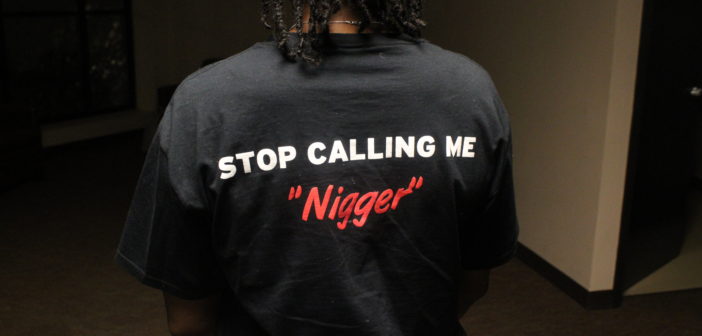Maybe we should think about those without the privilege of the majority of North Central’s population. How do black people function on campus? How do they react to racial tensions that present themselves, especially in this increasingly divided political climate?
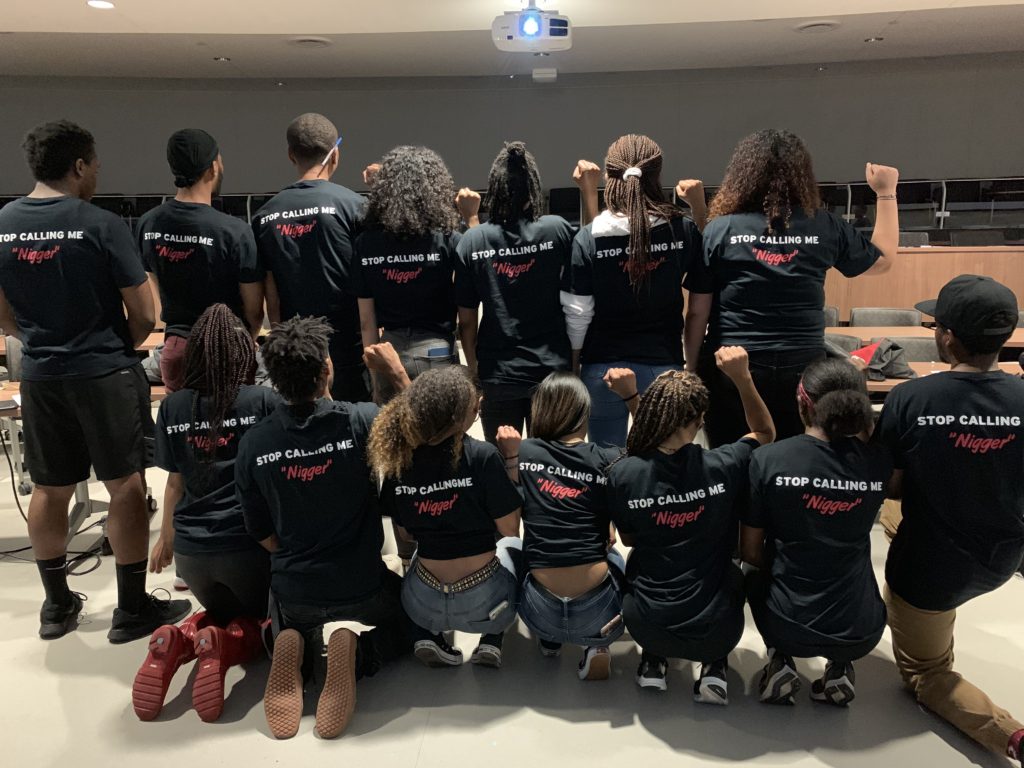
Students in BSA in shirts they designed after a racial bias incident occurred on campus.
Five black individuals in the North Central community discuss their experiences within this context, as well as how they feel these issues should be handled.
Multicultural affairs director
Dorothy Pleas sits across from me in her office, legs crossed and leaning forward. She’s serious, but there’s a smile in her eyes. When asked why she chose North Central, the answer was easy: family history. Her family is alumni, so she knew the campus well.
But, why the job of Multicultural Affairs Director?
“It was work that I was really passionate about, in the job description. So I really wanted to come and do this work, but I wasn’t coming to a place that was unfamiliar to me because I spent a lot of my time here before working here,” said Pleas.
Pleas is one of the few people of color on faculty staff here at North Central. According to research from College Factual, African Americans make up only 3.2 percent of the faculty population. Pleas found that when it comes to the black experience, it can be difficult in the workplace.
Audio PlayerThere are few options for her to turn to when she needs support. Fortunately, those options are quite close-knit.
“We have a really supportive group of black women faculty and staff. Like Samantha and DuShaun, Dr. Donnavieve Smith, Dr. Pettiway; so I am able to connect with those people and ask for advice and things like that,” said Pleas.
Several issues still arise, especially with incidents of racial bias on campus. Pleas noticed this as well, stating that, “just over the last three years, actually, there has been an uptick in bias incidents. So I think we’re following what’s happening around the rest of the country.”
Most Americans would agree. According to a 2019 analysis by the Pew Research Center, majorities in several race groups believe that U.S. race relations are deteriorating. Over half of Americans attribute it to President Trump and his campaign.
During the previous school year, someone wrote the “N” word on an RA’s whiteboard. Pleas was one of the first to be notified about it.
“I am the chair of the bias incidents response team, so before y’all see the stuff that’s happening, I see it, and I begin dealing with it. So my perspective is a little different in that I review all those things … But I think it’s something that’s happening nationally, and I think that North Central is following that trend,” said Pleas.
While Pleas does notice the issues when we see a rise in bias incidents, she wanted to make it known that she experiences a lot of diversity in her position at multicultural affairs.
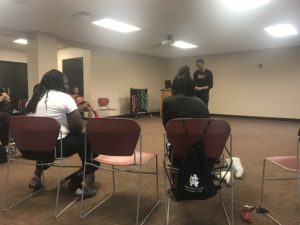
BSA votes for new cabinet members.
“I am in kind of a different space than some people. So, to me, and my perspective, the people that I work with are very open to diversity and supporting students of color, based on the area that I work in,” she said.
Pleas continues to work toward trying to help students of color be successful in all spheres. She talked about a study she is working on with Dr. Nicole Rivera to give black students a voice about racial tensions.
Audio PlayerRacial factors are not the only important thing. Educational implications play a role as well. Pleas is constantly working to promote diversity and inclusion on campus, both in society and in the classroom.
As she continues her research, she keeps looking for a solution.
“One project that I was working on (in 2018) that is continuing into (2019) is working on retention issues with black students and multiracial students as well. There is a definite lower retention rate of black students and students of two or more races, which is probably a combination of a lot of things like climate, finances, past experiences and things like that so what can the college do to help with those issues? I think we have to do more,” said Pleas.
When asked about ways that students and faculty could better understand the black experience, Pleas answered with the importance of learning how to be an ally to minorities.
She mentioned several ways that someone could become an ally if interested. They should understand it will not always be easy.
“(It’s) hard because you wanna just be an ally and think, ‘I’m doing everything perfectly,’ but if you establish yourself as an ally, there’s a continual learning piece there,” said Pleas.
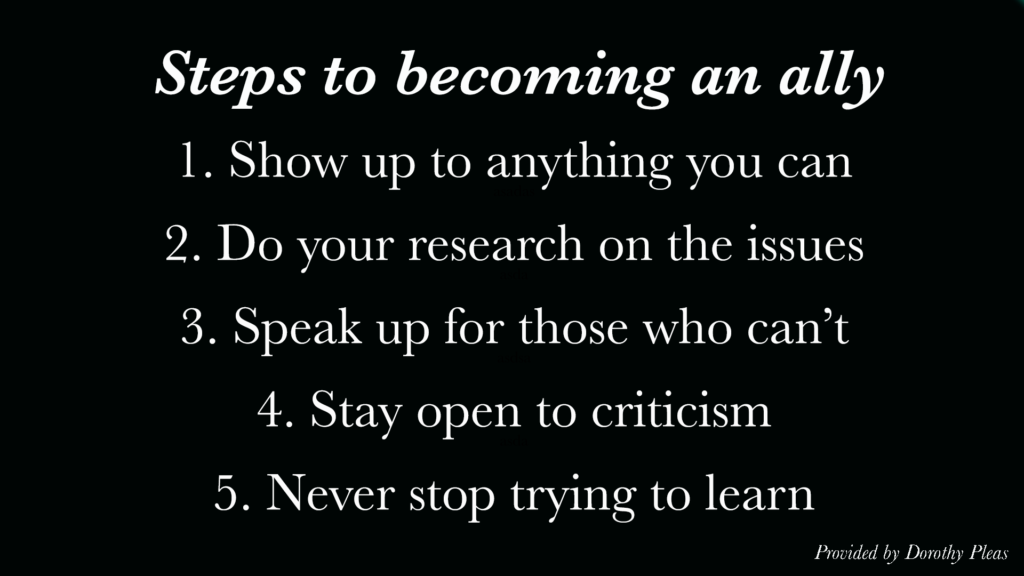
The two-sport athlete
Sitting at a desk with a grin on her face, Mitrese Smith, ’22, nods when asked if her experience in high school changed when she came to North Central.
Audio PlayerSmith did, however, want to make it known that her experience with sports was more than satisfactory.
“(My teammates) just pick me up because they know exactly what I’m going through. We all do the same conditioning, we have the same workout program, we all go to the same school, so they know how the classes are,” said Smith.
Smith mentioned that she has not experienced any instances of racial bias during her time as an athlete here at North Central.
Having a family can be a necessity when one runs into racial bias on campus. Smith talked explicitly about a blatant act of racism involving derogatory language and a whiteboard. She said that she was unhappy with the way it was handled.
“People don’t really know exactly what had happened,” she said. “The school’s kind of just trying to make it all go away in a sense. They’re not really talking about it, but I think that things like this have to happen in the world so that we become aware that it is still present and that it’s not okay.”
She wanted people not of color to understand that their privilege still exists, even if they might not always see it.
Audio PlayerThe outspoken activist
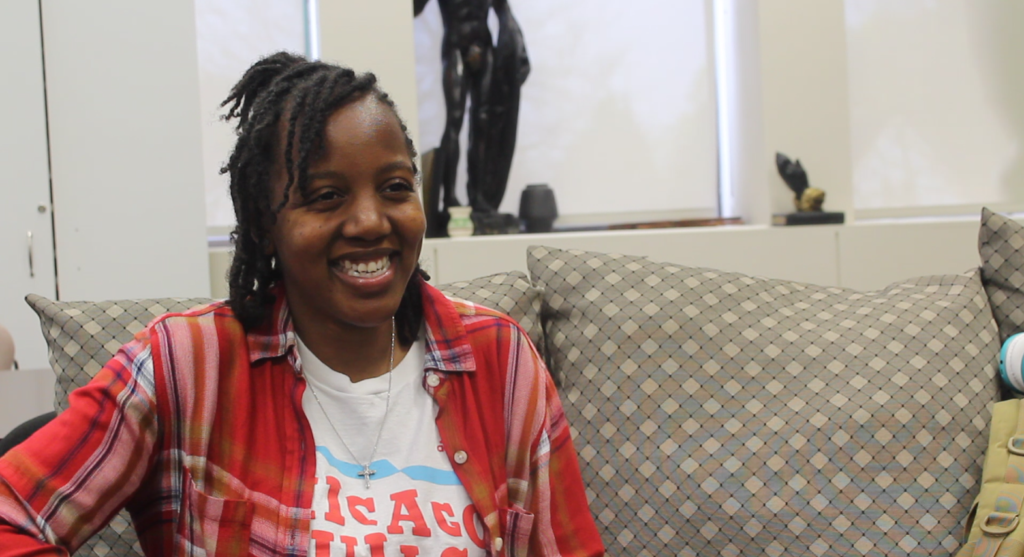 Mynk Richardson-Clerk, ’20, smiles, comfortably seated on a couch in a classroom in Goldspohn. Her hair is in dreadlocks and they frame her smile as she listens intently, waiting to answer questions about her experience.
Mynk Richardson-Clerk, ’20, smiles, comfortably seated on a couch in a classroom in Goldspohn. Her hair is in dreadlocks and they frame her smile as she listens intently, waiting to answer questions about her experience.
She was drawn to the school on a tour of the campus. She met the young woman who created Mosaic, the college’s diversity club.
“When I looked at other schools, I didn’t really see that on their campuses. Their (Black Student Unions) weren’t as active, they didn’t have Mosaics,” said Richardson-Clerk.
She was looking for a place where activism, social justice and diversity were part of the culture, and she found that in the people she met before getting here. However, when Richardson-Clerk got here, her experience was quite different.
“Freshman and sophomore year I interacted a lot, I think, with white students, and my friend groups tended to be more white just because that’s what happened,” she said. As time went on, Richardson-Clerk found that being around mostly white students created more stress in her life than she wanted.
“I think there’s always this background tension or stress that you don’t always realize is there until you come into a space where that stress isn’t there,” Richardson-Clerk said. “As I’m going through my week, as I’m going through my everyday life, you kind of overthink things.”
This type of anxiety is present every day and for various reasons. Richardson-Clerk provided several examples, including one involving the lacrosse team.
Audio PlayerBeing a black student on a mostly white campus can have its difficulties, especially when we’re at an age where we are just starting to find out who we are. Fortunately, the number of minorities making their way onto North Central’s campus is increasing.
In a study published by the National Council of Teachers of English, authors David Wallace and Annissa Bell found that black students at majority-white colleges, compared to historically black colleges, tend to find themselves more at odds with their black culture. Furthermore, black students are more reluctant to follow mainstream culture shifts.
Richardson-Clerk made the distinction between not wanting to be the stereotype while also wanting to embrace who she was as a black woman. She’s looked even deeper into this as racial incidents occur on campus. An incident in April 2019 incited a meeting with BSA members and other concerned students and staff.
During that meeting, students expressed their problems with the administration and feelings of exclusion.
“We were pushing for diversity training with faculty and staff, coaches and everyone so that they are able to handle these types of situations. There aren’t that many faculty of color, so your options are already limited. Being able to go to professors, even if they’re white, is really helpful,” said Richardson-Clerk.
In “A Snapshot of African Americans in Higher Education,” it was reported that students of color in majority-white colleges experienced higher levels of racial tension. They needed more social and educational support from faculty and administration. Richardson-Clerk agreed with this, saying that she believed students of color need more spaces to talk about their experiences.
Audio PlayerThe RA
Izaiah Webb, ’20, is tired. He slumps into his seat, his Illinois high school conference hood up, and sighs. Webb is tired for several reasons: he’s an RA, he’s a pole vaulter and he’s involved in several programs. But most importantly, he’s been dealing with a serious racial incident that happened to him in April.
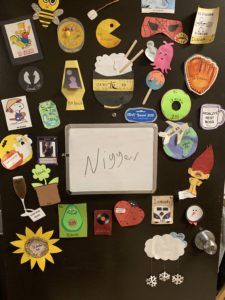
Webb is the student who received an unwelcome name on his door. It was immediately reported to the bias incident response team and he was in talks with the administration about an investigation.
Unfortunately, incidents like this are too familiar for him. In high school, Webb was no stranger to racist and biased remarks. There was one incident, however, that had a very lasting effect on him.
After a wrestling meet, several white students continually played music with racist tones, as well as making blatantly biased comments. Things escalated when Webb tried to stop it.
Audio PlayerWhen it comes to the incident in April, Webb found himself quite discontented with how the administration chose to handle the situation.
“I did not think that they handled the situation well … I was asked, ‘Should we do programs in Patterson, to kind of talk about these things?’ Yeah, that would be nice, but not everyone goes to programs and the people that do go to these things are already aware of these situations,” said Webb.
This is part of the reason why BSA was so vocal about this issue. Webb said they created a set of demands that they worked with the administration to implement them.
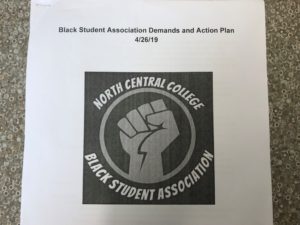
“(We came) up with these demands for the college to help them to prevent some of these types of things from happening. We just (had) a two-page list of things and went into detail about it,” he said.
While there may be an improvement on the side of the paperwork and putting things to practice, Webb still finds himself quite uneasy.
As a person of color, he is constantly aware of and thinking about being a constant advocate for himself and his race. Webb explained that there is a continual process of noticing small instances of bias, and whether to react to them.
Audio PlayerThis is a norm for many students of color on majority-white campuses. In “What it’s like to be Black on campus now,” Melissa Harris-Perry described the experiences of 10 black journalists on college campuses.
All of them describe the issues that Webb mentions, as well as ones more specific to their college atmosphere. Webb and other members of BSA know the stress and anger that ignites from blatant acts of racism, as well as the pain that comes from them.
In a Fireside Chat about Webb’s incident, BSA laid out their demands to the school. The members spoke passionate words about the school and how they feel they are treated.
Video courtesy of Izaiah Webb
Webb said that this process affected his mental health, as well as a need to be a constant advocate as a minority.
“There aren’t too many of us on campus. I think last year it was like 3% and now it’s just under 5%. It’s hard because, because there’s not a lot of people and when dealing with situations like this, you feel alone,” he said.
North Central’s 2024 graduating class is the most the ethnically diverse class the college has ever had. However, only 30 percent of freshmen are non-white, and 5.6 percent are African American.
He noted that these types of situations need to be noticed and that they take a toll on a person, especially when you already feel alone.
Audio PlayerThe marketing professor
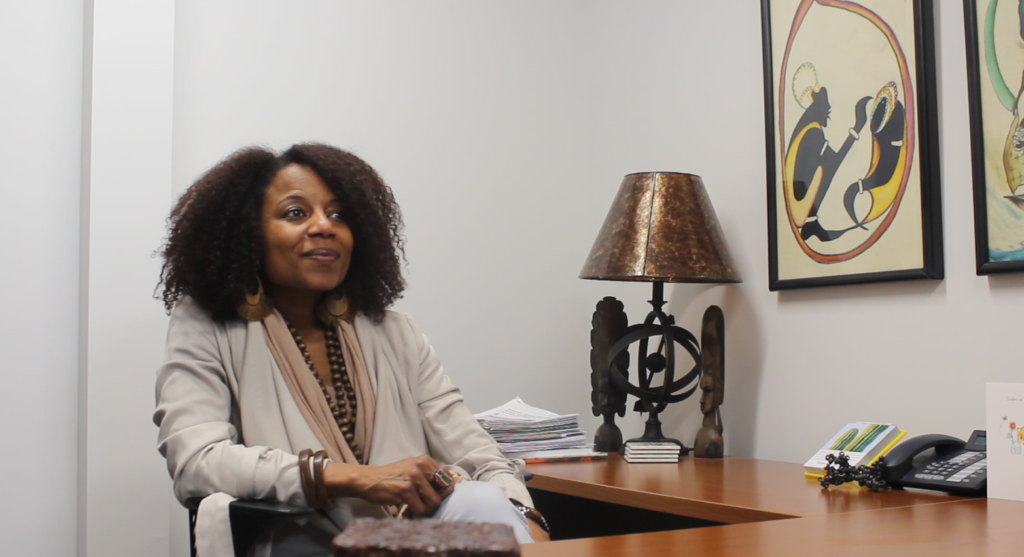 Donnavieve Smith is a very busy woman. She is the only black female marketing professor at North Central and that can have an effect on the way she is treated.
Donnavieve Smith is a very busy woman. She is the only black female marketing professor at North Central and that can have an effect on the way she is treated.
“They come in the classroom, and I may be the first black person they’ve ever seen in a position of authority,” she said. “If they have been socialized to believe that black people, Hispanics and so on are inferior, they are probably in shock when they get here.”
Smith has been around for almost 15 years, and because she’s been around so long, she should have seen quite a few changes. However, that hasn’t been the case.
“I believe that the school has talked about changing since I’ve been here. I don’t know necessarily know if the strategies or tactics or initiatives have always matched the level of commitment that comes across on paper,” said Smith.
The United Negro College Fund found in 2018 that “even before graduating high school, many black students lack the resources needed to get into college and to succeed there.” Smith said that once students get here, these resources are still not being utilized to the fullest extent.
Smith made it very clear that she thought protection was the most important part of being good faculty for students. Along with that, sensitivity training should be mandatory for all incoming students. Starting this year students and staff had to do a mandatory diversity training module that was uploaded to their Blackboard accounts.
However, Smith thinks these trainings will not solve the problem.
Audio PlayerSocialization and political climate also play a role in how students behave in Smith’s eyes.
“I really do believe, at times, that students forget that I, too, am African American and these issues that they’re discussing, these aren’t just in the news, these affect me as well and I may have feelings about them as an African American based on my history, my upbringing and my experience,” she said.
She had much to say about classroom incidents but asked that they not be shared for the sake of students’ reputations. Furthermore, Smith emphasized that people who do not know how to interact with people of color are not going to understand racial bias and respect training right away.
Audio PlayerShe said that the recent racial incident with Izaiah Webb was a “wake up call for all of us.”
“We, as an institution, as a body, as a campus community, (have) a significant amount of pain that exists amongst us. And again, like I said, as faculty, as administration, it is our responsibility to do what we can to protect our students and to ease that pain,” said Smith.
The president
North Central President Troy Hammond allowed Chronicle journalists into his office for an interview about the instances of racial tension and how it can be solved.
“To be clear, we know we’ve got problems and challenges on the campus and this is why we’re meeting today because of some of the things that have happened … but I am absolutely somebody who wants to be leading the institution from a place of wanting to make this place better,” said Hammond.
As a leader of a majority-white institution as someone who is also white, it can be difficult to effectively navigate the complexities and intricacies of race and unconscious bias. The University of Arizona said on their webpage about diversity that students in these situations experiencing racial bias can sometimes feel as though their voices are not being heard compared to their white peers.
The president also wanted to make it known that steps taken to improve inclusion and diversity will arrive soon.
“We have specific actions and goals in the strategic plan addressing diversity and inclusion. So one of the charges will be to look at that, what’s being done, what’s not being done, is there more we can include in the strategic plans as a regards to diversity and inclusion,” he said.
All of the interviewees agreed that the actions taken by the administration are not completely fitting their wants and needs. They all emphasized the importance of black empowerment, especially when instances of racial bias happen.
Webb blatantly expressed his frustration and responded the best way he knew how: his voice.
“Just know that your voice is powerful and if something happens to you, someone says something, I think it’s important to use your voice,” said Webb. “Tell the administration what happened so these things won’t continue to happen… just know that you’re strong and you have people at this college that do care about you even if it doesn’t feel like it.”

